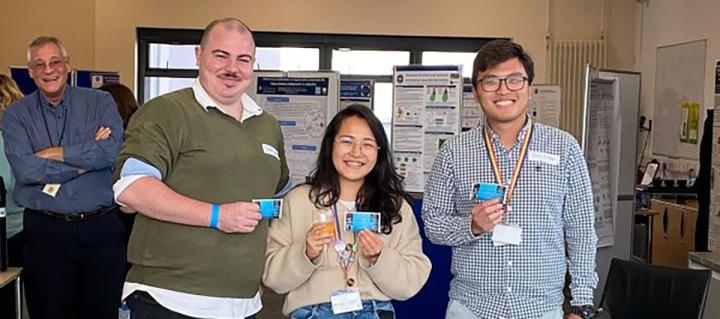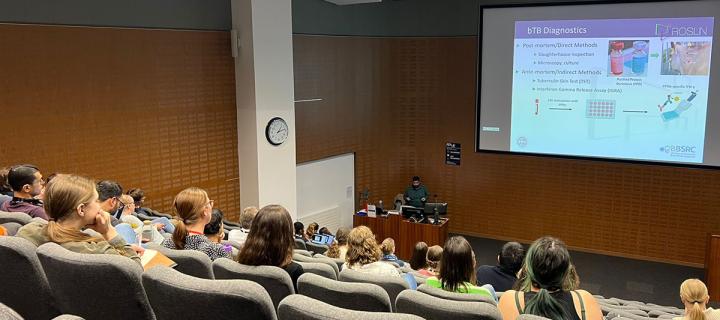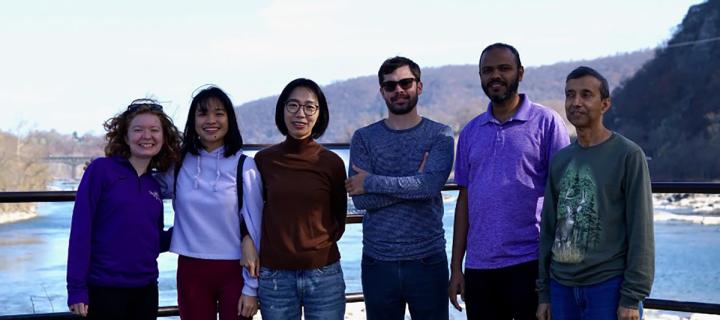Current projects based in Edinburgh
Description of the four PhD projects in Integrated One Health Solutions that are currently based at the University of Edinburgh.
Empowering antibiotics using host defence peptide to fight antimicrobial resistance in epithelial and systemic infections
Students: Patrick Lennard
Supervisors: Prof Julia Dorin, Julia Dorin, Jenny Regan (Edinburgh), Dr Peter Nibbering and Prof Pieter Hiemstra (Leiden)
Project: Antimicrobial Host Defence Peptides (HDPs) show great promise in combating antimicrobial-resistant (AMR) bacteria. During Patrick’s tenure in Leiden, novel synthetic antibacterial and anti-biofilm peptides (SAAPs) with enhanced activity against AMR pathogens (including those within biofilms) that complement (i) host defences, and (ii) the efficacy of conventional antibiotics, were assessed against AMR bacteria in parallel models of skin and respiratory epithelium. While activity against AMR bacteria is enhanced and prophylactic in skin infection models, this activity is limited in respiratory tissue.
Using a complementary in vivo modelling strategy, Patrick is now developing Drosophila melanogaster as a model of both infection and treatment with SAAPs alone and in synergy with antibiotics, based at the King’s Buildings campus. Crispr/Cas9 generated, HDP-depleted Drosophila will also be employed to delineate potential synergies between native HDPs and antibiotics against AMR bacteria.
Publications:
- Lennard, P.R.; Hiemstra, P.S.; Nibbering, P.H. Complementary Activities of Host Defence Peptides and Established Antibiotics in Combating Antimicrobial Resistant Bacteria. Antibiotics 2023, 12, 1518, doi:10.3390/ANTIBIOTICS12101518.
- Thomson, D.J.; Ma, D.; Lennard, P.R.; Ferri, M. Evaluation of a Global Training Program in One Health Communication. One Health & Implementation Research 2023, 3, 55–68, doi:10.20517/ohir.2023.12.
- van Gent, M.E.; Reijden, T.J.K. van der; Lennard, P.R.; Visser, A.W. de; Schonkeren-Ravensbergen, B.; Dolezal, N.; Cordfunke, R.A.; Drijfhout, J.W.; Nibbering, P.H. Synergism between the Synthetic Antibacterial and Antibiofilm Peptide (SAAP)-148 and Halicin. Antibiotics 2022, 11, 673, doi:10.3390/ANTIBIOTICS11050673.

Exploiting Klebsiella pneumoniae genomics for One Health diagnostics
Student: Jiayu Wang
Supervisors: Dr Thamarai Schneiders Prof David Gally (Edinburgh), Dr Els Wessels, Ed Kuiper and Eelco Franz (Leiden)
Project: Klebsiella pneumoniae (Kp) represents a major threat to human and animal health where this challenge has met significant efforts in genome analyses to elucidate the factors that contribute to its population structure, pathogenicity status and critically, its antimicrobial resistance.
Previous studies have demonstrated that the population structure of Kp encompasses specific traits that delineate human, animal and environmentally associated strains. Whilst these gene specifications are useful, there remains a critical need for greater discrimination of Kp genomic sequences for population-based analyses within complex datasets e.g. metagenomic data. As such the overarching aim of this project is to expand our ability to probe complex metagenomic or microbiome datasets to dissect the prevalence, transmission potential and the emergence of Kp; not least in developing tools for rapid diagnostics.
The key aims of this project are to (i) establish greater discrimination of Kp population structure, (ii) Validation and Identification of specific markers, identified in Aim 1, in complex datasets. The outlined proposal will extend and produce novel insights into the population structure caused by the major nosocomial pathogen Klebsiella pneumoniae.
Towards development of a multibiomarker test for detection of tuberculosis in cattle
Student: Hamza Khalid
Supervisors: Prof Jayne Hope and Dr Tim Connelley (Edinburgh) and Prof Dr Annemieke Geluk and Dr Paul Corstjens (Leiden
Project: Mycobacterium tuberculosis, the causative agent of human tuberculosis (TB), causes more deaths than any other single human infectious disease worldwide. In addition, M. bovis, causing TB in cattle, leads to significant economic losses to the agricultural sector, and represents a major zoonotic disease challenge. For both human and bovine TB there is an urgent need for sensitive and specific point-of-care (POC) diagnostic tests. Such tests will represent major game-changers, particularly in low resource settings.
This PhD project aims to develop a low complexity, diagnostic test for bovine TB detection in the field based on a quantitative lateral-flow assay format suitable for multiplex detection of cytokines and antibodies at POC level. This test format, pioneered for human TB, will be translated for detection of bovine cytokines based on a 6-biomarker signature specific for active human TB. Novel serum proteins will be assessed for their potential to detect disease, infection and vaccination and evaluated in the POC format using samples from cattle under experimental, and field conditions. The results established using the novel POC diagnostic test will be compared to the currently available diagnostic tests.
Publications from the project:
- Hamza Khalid, et al, 2023; Development of lateral flow assays to detect host proteins in cattle for improved diagnosis of bovine tuberculosis". Front. Vet. Sci. 10:1193332. https://doi.org/10.3389/fvets.2023.1193332
- Hamza Khalid* et al, 2022; Protein Levels of Pro-Inflammatory Cytokines and Chemokines as Biomarkers of Mycobacterium bovis Infection and BCG Vaccination in Cattle" Pathogens 11, no. 7: 738. https://doi.org/10.3390/pathogens11070738

Investigating inter-species variation in antiviral IFITM proteins and its implication on zoonosis
Student: Nelly Mak
Supervisors: Dr Richard Sloan (Edinburgh) and Dr Marjolein Kikkert (Leiden)
Project: Interferon Induced Transmembrane Proteins (IFITMs) are host innate immune proteins that inhibit cell entry of a wide range of viruses of global importance including influenza A virus, HIV, dengue virus, Ebola virus, SARS-coronavirus (CoV), MERS-CoV, chikungunya virus and Zika virus[1]. The ability of IFITMs to inhibit viruses depends on their cellular localisation and post-translational modification.
The aim of this project is to show how genetic variation in IFITM alleles from a panel of species results in variation in their post-translational modification and antiviral efficacy, thus exerting a barrier to cross species virus transmission. It will use range of molecular and cellular approaches to define this in the context of viral infection for a number of emerging viruses. The project will also include confocal imaging, flow cytometery working in a biocontainment safety level 3 (BSL3) lab, and live animal (mouse) infection work, the latter with a particular emphasis on coronavirus infection. The project entails 3 years research at Edinburgh University, and with the fourth and final year based in Leiden University in the Netherlands.

More information


